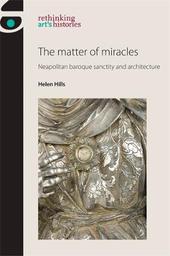
|
The Matter of Miracles: Neapolitan Baroque Architecture and Sanctity
Hardback
Main Details
| Title |
The Matter of Miracles: Neapolitan Baroque Architecture and Sanctity
|
| Authors and Contributors |
By (author) Helen Hills
|
| Series | Rethinking Art's Histories |
|---|
| Physical Properties |
| Format:Hardback | | Pages:656 | | Dimensions(mm): Height 234,Width 156 |
|
| Category/Genre | Art and design styles - Baroque
History of architecture |
|---|
| ISBN/Barcode |
9780719084744
|
| Classifications | Dewey:720.94573109032 |
|---|
| Audience | | Professional & Vocational | |
|---|
| Illustrations |
49 colour illustrations, 72 black & white illustrations
|
|
Publishing Details |
| Publisher |
Manchester University Press
|
| Imprint |
Manchester University Press
|
| Publication Date |
13 October 2016 |
| Publication Country |
United Kingdom
|
Description
This book investigates baroque architecture through the lens of San Gennaro's miraculously liquefying blood in Naples. This vantage point allows a bracing and thoroughly original rethink of the power of baroque relics and reliquaries. It shows how a focus on miracles produces original interpretations of architecture, sanctity and place which will engage architectural historians everywhere. The matter of the baroque miracle extends into a rigorous engagement with natural history, telluric philosophy, new materialism, theory and philosophy. The study will transform our understanding of baroque art and architecture, sanctity and Naples. Bristling with new archival materials and historical insights, this study lifts the baroque from its previous marginalisation to engage fiercely with materiality and potentiality and thus unleash baroque art and architecture as productive and transformational. -- .
Author Biography
Helen Hills is Professor of History of Art at the University of York -- .
Reviews'This book gathers together the results of important, original and ambitious research. [...] from the title on, HH challenges one to read between the lines and to go beyond the appearance of architecture and baroque sanctity. [...] Hills interprets 17C and 18C architecture as a 'machinic', a productive phenomenon and in terms of potential; not the reflection of the will of patron or architect, but a microcosm, an 'assemblage' that through its materiality and physical presence creates relations, worshippers, city, politics and spirituality.' Annali di architettura -- .
|